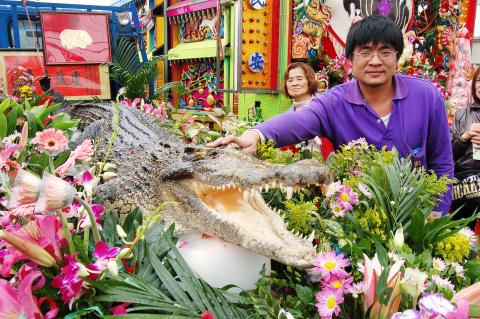Jianan Temple in Taoyuan County’s Pingchen City held a ceremony last Saturday at the occasion of the thousandth birthday of the temple deity, the Sage King Kaichang. One of the devotees, Teng Hsu-tun, presented a big crocodile weighing 195kg as an offering to the temple deity. By comparison, other more common offerings, such as pigs and lambs, presented on the offering table looked less impressive.
Teng said he decided to use a big crocodile as offering because it was a novelty, that would add an air of freshness to the ceremony. Teng also wanted to display his filial piety by giving his father his 15 minutes of fame. He said he spent NT$180,000 on this very big crocodile, which is more than the value of all the pigs and lambs offered to the deity.
The crocodile was still alive and kicking when it was brought to Teng’s house from Pingtung County. Because he has been breeding pigs for offerings for years, slaughtering a crocodile was not a problem for him, since the procedure is similar to slaughtering a sacrificial pig. The crocodile was distributed between the devotees in the evening, after the ceremony. Only the reptile’s shiny skin remained.

PHOTO: LUO CHENG-MING, LIBERTY TIMES
照片:自由時報記者羅正明
The crocodile offered by the Tengs was about 2m long. As soon as it arrived at the temple early last Saturday morning, it attracted the attention of lots of people who gathered around the croc. Teng also put an apple between its fangs in the hope that the Sage King Kaichang would assure peace and calm, as the Mandarin Chinese words for “apple” and “peace” are homophones — both words are pronounced “ping.”
After the temple ceremony, the crocodile was cooked and eaten by devotees at a temple banquet. Teng said people were very surprised when they saw the crocodile and wanted to have their photograph taken with it. He said this made him feel quite proud. He also said the crocodile tasted good and fresh and that it didn’t smell too bad, although it was a bit chewy.
(LIBERTY TIMES, TRANSLATED BY TAIJING WU)
開漳聖王聖誕千秋,桃園縣平鎮市建安宮信眾鄧旭敦,特地供奉一隻重達一百九十五公斤的大鱷魚當供品,供桌上常見的豬跟羊便相形失色。
鄧旭敦說,決定用超級大鱷魚敬拜開漳聖王,主要是大家都沒看過,典禮上新鮮感十足,也順便讓老爸風光一下,藉此表達孝心。他說,超級大鱷魚以新台幣十八萬元購得,比供奉給神明的豬跟羊都還要貴。
大鱷魚從屏東縣運抵家裡時還活蹦亂跳,由於飼養神豬多年,要宰殺大鱷魚並不困難,方法跟殺豬敬神一樣,鱷魚當晚祭典結束就分給信眾,剩下的只有閃閃發亮的鱷魚皮。
鄧仁火、鄧旭敦敬獻的大鱷魚長約二公尺,上週六一早運抵建安宮廟埕拜拜後,吸引大批人潮圍觀,鄧旭敦還找來一顆蘋果給大鱷魚咬住,開漳聖王也能保佑一家人平平安安。
廟會結束時,辦桌時就把鱷魚肉拿來煮,鄧仁火說,信眾看到鱷魚都很驚訝,紛紛搶著拍照,讓他覺得很有面子。他說鱷魚味道鮮美,沒有臭味,只是吃起來比較硬一點。
(自由時報記者羅正明)

US President Donald Trump has renewed his ambition to take control of Greenland for national security reasons and questioned whether Denmark has any legal right to the Arctic island. The debate has revived scrutiny of how Greenland became part of Denmark, its current self-rule and path to independence, and Washington’s military footprint. HOW DID DENMARK GET GREENLAND? Greenland was inhabited by Inuit peoples from Asia and North America intermittently from around 2,500 BC. Around 985 AD, Vikings led by Erik the Red settled in southern Greenland, farming and building churches. Around the same time, ancestors of today’s Inuit arrived, living as hunters

Have you ever gazed at the night sky and felt as though the Moon loomed larger than usual? Your eyes were not deceiving you. The Moon’s apparent size can __1__ subtly depending on where it is in its orbit. On certain occasions, it reaches its fullest phase while at its closest point to Earth. When these two events __2__, scientists and the public refer to the spectacle as a “supermoon.” The Moon does not orbit our planet in a perfect circle. Instead, it travels along a more oval-shaped __3__, completing one full orbit every 27 days. Consequently, there are times when

AI-generated summaries are shaking up the media world. Tools like Google’s AI Overviews now provide users with direct answers above the search results, resulting in fewer people clicking on news links. For publishers who rely on that traffic to generate advertising revenue, this shift is hitting hard. The fallout is measurable. Many sites have seen a sharp drop in traffic since AI summary features rolled out. An analysis revealed that a news outlet that had once ranked first on Google lost up to 79% of its traffic when its link appeared beneath an AI-generated summary. Statistics also show that

Owls have long fascinated people with their distinctive appearance and mysterious habits. These nocturnal birds possess large, round eyes and a flat facial disc. Their feathers come in shades of brown, gray, or white, helping them blend easily into the darkness. The most remarkable trait of owls is that they can turn their heads without damaging blood vessels. Contrary to popular belief, they can only rotate their heads up to 270 degrees, not 360 degrees. Owls have 14 cervical vertebrae, which is twice as many as humans. This special physical structure compensates for their inability to move their eyes within their